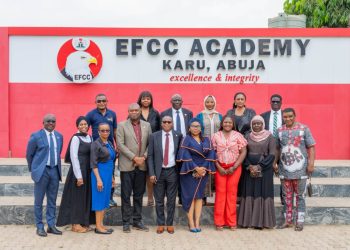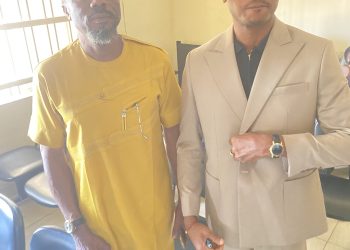By Nkechi Eze
In a fresh effort to deepen public awareness on the dangers and consequences of corruption, the Economic and Financial Crimes Commission (EFCC) has unveiled a new radio drama series titled Eagle Theatre, developed in partnership with the National Film and Video Censors Board (NFVCB).
The initiative was formally presented on Thursday, June 19, 2025, at the EFCC Corporate Headquarters in Abuja, where the Director General of the NFVCB, Dr. Shaibu Husseini, handed over the drama series to the Executive Chairman of the Commission, Mr. Ola Olukoyede.
The EFCC’s spokesperson, Dele Oyewale, confirmed the development in an official statement, describing the drama as a major boost to the Commission’s public sensitization efforts.
Dr. Husseini noted that Eagle Theatre is the product of collaboration between an innovative agency and an anti-graft body—designed to resonate with the everyday realities of Nigerians through storytelling. The drama explores real-life-inspired scenarios and everyday moral choices faced by citizens, ultimately promoting values such as integrity, accountability, patriotism, and transparency.
“We are here to present this special project,” Husseini said. “Conceived under our Service Innovation Unit, this is our modest contribution to the ongoing anti-corruption campaign being championed vigorously since you became the Chairman of this Commission. Through the compelling medium of drama and storytelling, Eagle Theatre explores real life-inspired scenarios… highlighting the dangers and consequences of corrupt practices while promoting the values of integrity, patriotism, accountability, and transparency.”
Dr. Husseini added that drama is a powerful tool for social change when it reflects the choices and challenges of ordinary people. He expressed confidence that the programme will enhance the EFCC’s public engagement strategy and help Nigerians understand the far-reaching effects of economic and financial crimes.
He further assured that the NFVCB will continue to galvanize support from the film industry to align with the EFCC’s anti-corruption mission. Plans are already underway, he said, to adapt the radio drama into video format, which will be aired on national television.
“Our plan is that when this catches on, we will translate it into videos because when people see and hear, it sticks more. We will collaborate with the NTA to see how we can run them,” he explained. “I wish to restate the unwavering commitment of the NFVCB to work collaboratively with the EFCC in advancing national development, promoting civic responsibility and ensuring that the media and entertainment sectors are instruments of positive change.”
In response, EFCC Chairman Ola Olukoyede described the project as a vital tool in the Commission’s efforts to prevent corruption through advocacy and enlightenment. He said that awareness creation was a key component of EFCC’s mandate beyond investigation and prosecution.
“Our mandate is not just about investigation and prosecution; it has its social aspects—prevention through advocacy, enlightenment and reorientation,” Olukoyede said. “When you arrest people for spraying money or mutilating the naira, many of them claim ignorance. Even though ignorance is no excuse in law, it is incumbent on us to also create awareness. One of the best ways to do that is through the very industry you regulate.”
He emphasized that Eagle Theatre will play a critical role in sensitizing the public, particularly young Nigerians, on the consequences of corruption and criminal behavior.
“I’ve discovered on this job that when you let people know the implications of their actions, the propensity to do worse is reduced. Many people don’t even understand the implications of being an ex-convict. For instance, you may be denied visas, public appointments, or employment for the rest of your life,” he warned.
He called on the NFVCB to continue collaborating with the EFCC to change public attitudes toward corruption, particularly by instilling a culture of integrity and hard work among youths.
“If you help us make them aware of these implications, it will go a long way in reducing the tendency on the part of our people to see corruption as a way of life. For us to make our youths believe in the dignity of labour and hard work is very important,” Olukoyede added. “I believe that the drama episodes will go a long way in building emotions and appealing to the minds of people, which will help reform character.”
The event ended with the formal handover of the drama episodes and reaffirmation of commitment by both agencies to continue the partnership for greater national impact.
















